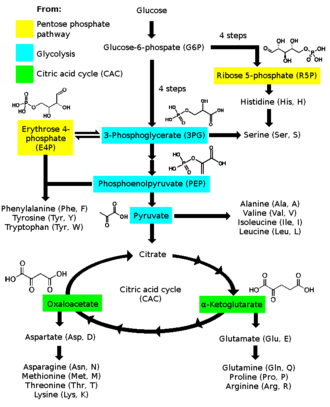Anabolism
Anabolism is the set of metabolic pathways that construct molecules from smaller units. These reactions require energy, known typically as an endergonic process. Anabolism is one of the two parts of metabolism, the other being catabolism, where larger molecules are broken down into smaller ones, releasing energy. Anabolic processes are crucial for cell growth, the repair of tissue, and the storage of energy for future use.
Overview
Anabolism involves the synthesis of complex molecules such as proteins, nucleic acids, carbohydrates, and lipids from simpler molecules like amino acids, monosaccharides, glycerol, and fatty acids. These processes are vital for the growth and maintenance of cells and tissues, as well as for the storage of energy in efficient forms such as glycogen and triglycerides. Anabolic pathways are controlled by a set of enzymes that require energy inputs, primarily in the form of adenosine triphosphate (ATP), to drive the reactions forward.
Key Processes
Protein Synthesis
Protein synthesis is a primary example of anabolism, where ribosomes create proteins by forming peptide bonds between amino acids. This process, also known as translation, is essential for cell structure, function, and regulation.
Nucleic Acid Synthesis
The synthesis of nucleic acids, including DNA and RNA, is another critical anabolic process. It involves the assembly of nucleotides into long chains, which are necessary for genetic information storage and transmission.
Photosynthesis
Photosynthesis is a unique form of anabolism that occurs in plants, algae, and some bacteria. It converts carbon dioxide and water into glucose and oxygen using sunlight as energy. This process is fundamental for the energy flow in the ecosystem.
Lipid Synthesis
Lipid synthesis involves the creation of fats and steroids from simpler molecules. This process is essential for creating cell membranes, storing energy, and producing signaling molecules.
Regulation
Anabolic processes are tightly regulated to ensure that they occur as needed. Hormones such as insulin, growth hormone, and testosterone play significant roles in promoting anabolic pathways. Conversely, conditions of stress or starvation can lead to the downregulation of these pathways in favor of catabolism, which provides immediate energy to the body.
Clinical Significance
Disruptions in anabolic pathways can lead to various diseases. For example, an inability to effectively perform protein synthesis can result in muscle wasting conditions. Additionally, excessive or unregulated anabolism can contribute to conditions such as cancer, where abnormal cell growth is a primary characteristic.
Transform your life with W8MD's budget GLP-1 injections from $125.
W8MD offers a medical weight loss program to lose weight in Philadelphia. Our physician-supervised medical weight loss provides:
- Most insurances accepted or discounted self-pay rates. We will obtain insurance prior authorizations if needed.
- Generic GLP1 weight loss injections from $125 for the starting dose.
- Also offer prescription weight loss medications including Phentermine, Qsymia, Diethylpropion, Contrave etc.
NYC weight loss doctor appointments
Start your NYC weight loss journey today at our NYC medical weight loss and Philadelphia medical weight loss clinics.
- Call 718-946-5500 to lose weight in NYC or for medical weight loss in Philadelphia 215-676-2334.
- Tags:NYC medical weight loss, Philadelphia lose weight Zepbound NYC, Budget GLP1 weight loss injections, Wegovy Philadelphia, Wegovy NYC, Philadelphia medical weight loss, Brookly weight loss and Wegovy NYC
|
WikiMD's Wellness Encyclopedia |
| Let Food Be Thy Medicine Medicine Thy Food - Hippocrates |
Medical Disclaimer: WikiMD is not a substitute for professional medical advice. The information on WikiMD is provided as an information resource only, may be incorrect, outdated or misleading, and is not to be used or relied on for any diagnostic or treatment purposes. Please consult your health care provider before making any healthcare decisions or for guidance about a specific medical condition. WikiMD expressly disclaims responsibility, and shall have no liability, for any damages, loss, injury, or liability whatsoever suffered as a result of your reliance on the information contained in this site. By visiting this site you agree to the foregoing terms and conditions, which may from time to time be changed or supplemented by WikiMD. If you do not agree to the foregoing terms and conditions, you should not enter or use this site. See full disclaimer.
Credits:Most images are courtesy of Wikimedia commons, and templates, categories Wikipedia, licensed under CC BY SA or similar.
Contributors: Prab R. Tumpati, MD



